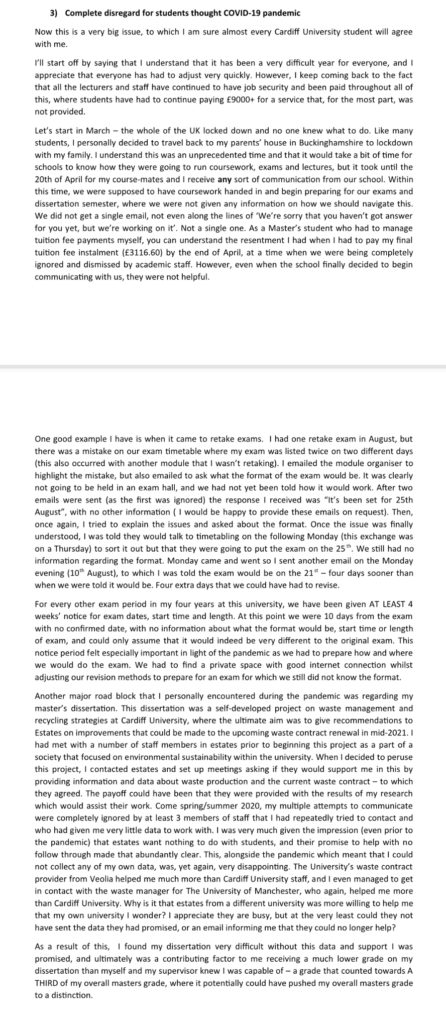
A ‘love letter’ to Cardiff students: Cardiff Grad writes six-page complaint to University
‘students continue to be treated with a huge level of disrespect’
Cardiff graduate, Grace, recently wrote a six-page complaint to Cardiff University regarding their mental healthy services, supposed discrimination against those with learning disabilities, and what she called a “complete lack of support for students” throughout the pandemic. Now that she is officially no longer at the university, she felt as though she could submit this letter without it having possible repercussions on her degree.
She compares her complaints to a love letter for current and prospectus Cardiff students going through the system who, she argues, are still treated like “doormats by university lecturers and staff.” Grace, like many other students, are “sick and tired of universities not being held accountable”, and wants “other students to use their voices too.”

‘Do you have any hopes that the university will act on this?’
Grace said: “I don’t expect to get any response from the university”. Within her letter, she argued that the only response anticipated from Cardiff – as well as any other university – is to “either brush it under the rug and pretend it didn’t happen, or to blame and gaslight students.”
She said that what she wishes from the university is for them to take responsibility, “not just a slap on the wrist ‘My bad’ then pretend it didn’t happen, but really taking responsibility and publically taking actions to show that.”
She believes they could provide staff with proper training to approach and help those with learning disabilities or those with mental health issues, or provide a more open conversation between staff and students in dealing with issues, “rather than the university hiding behind endless ‘procedures’ with the hopes that the student will eventually drop their complaint”.
She said: “We are essentially paying customers for a service – a service that for the most part we are not provided with to a standard that we should expect for £9k/y.” She compares it to paying money for a 5* hotel, only to turn up and find you’re staying in a hostel where you share a bunk with a total stranger.
‘What do you wish the university did differently?’
“I really wish the university didn’t put so much blame on the students instead of taking some ownership of their mistakes.” As stated in her letter, her third-year supervisor put her down as dyslexic in her viva for when she couldn’t do a calculation on the spot in her head. “When I requested a review of my mark for that reason, stating what my supervisor had said to me, I was explicitly told that: ‘the university does not allow students to question the academic judgement of markers'”. She questions the fairness of this.
Another area Grace feels needs to change is the mental health services provided by the university. She said: “If the university cannot provide a suitable and effective mental health service then they should not be offering it and should refer students elsewhere.”
She considers herself incredibly lucky to have a supportive family who helped her emotionally and financially “in receiving private counselling after unsuccessful support from the university.” Though she is aware there are many other students out there who cannot afford private sessions, or do not have a supportive family environment, “so the university is all they have.”
“My experience of this service was that it caused more damage than if I had not used the service, so I have so much sympathy for those who only have the university services for support.”

‘What is your message to current and prospective students?’
She urges current and prospective students to “use their voice as much as possible” – stating that students are powerless on our own, “which is something that the university continues to make abundantly clear by telling us that we are the problem.” She argues that together, students can be a powerful force if we “all choose to speak out about unfair treatment and poor management in order to hold the university accountable”.
Including herself, she feels as if many students are scared to speak out in case of backlash or unfair treatment, “simply because they do not have the time or emotional energy to spend going through the endless complaint procedures.”
Grace said: “I know full well that I will not get anything out of my complaint to the university – I have finished my education and I have already had all these terrible experiences in dealing with them, but I really don’t want any more students to go through this – so this is my love letter to them.”
She stresses that universities will continue to get away with their “horrendous treatment of students” unless something is done about it, “and the only way we can make an impact is if we all work together.”

When Grace submitted her complaint, she included the SU Student Advice Service in the email, which “supposedly gives advice regarding complaints.” She has yet to received any response from the university itself. However, she received an email from the SU Student Advice Service, and says this is what stood out to her the most:
“In terms of the University’s formal Complaint Procedure, this states that if you do want to make a complaint, you must do so within 28 days of the date the issue arose, or from the latest occurrence of the issue if it is ongoing. If you are no longer a registered student at the University, you must also complain within 28 days of your formal leaving date. The University are usually very strict with their deadlines so, if you miss the deadline, the University will only look at your complaint if you provide and evidence good reason why you were not able to meet it.”
Essentially, they have told Grace, any complaints made after the 28 days are disregarded, “as if they didn’t happen.”
The Cardiff Tab reached out to Cardiff University for comment:
A Cardiff Spokesperson said “We do not comment on individual cases. The issues raised will be carefully considered. We will respond directly to the individual who has brought concerns to our attention and we will do this as soon as possible.”
“What we can say is that we are committed to supporting our students’ health and wellbeing and developing an inclusive learning environment for all.”
“Our mental health provision ranges from prevention and awareness, to support and referral to the NHS and other community partners. We also provide specialist non-judgemental and confidential advice to students with disabilities and make any reasonable adjustments to learning, teaching and assessment that are needed.”
“We know the coronavirus pandemic has presented everyone with unprecedented challenged and pressures, and we have put in place additional counselling and wellbeing support and introduced on-line support and peer-to-peer mentoring. We are also working closely with our NHS colleagues to help improve access to support for our students. Our services have been accessible remotely throughout the pandemic and local restrictions.”
“To support our students academically during this time, we have introduced measures such as a safety net and updated our extenuating circumstances policy, to ensure that no student is disadvantaged as a result of the pandemic.”
Related stories recommended by this writer:
• We spoke with Welsh Education Minister Kirsty Williams: Here’s what we know
• Cardiff lecturer posts video calling students ‘idiots’ for wanting safety net
• An ex-Swansea lecturer is living in an underground tunnel to protest HS2









































